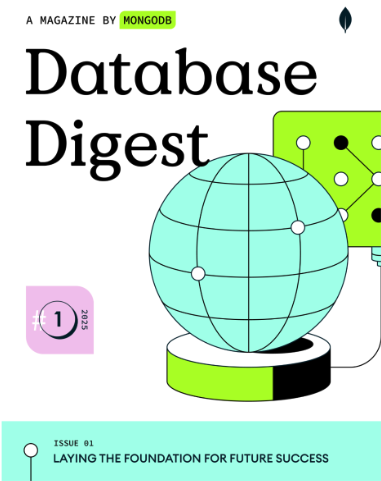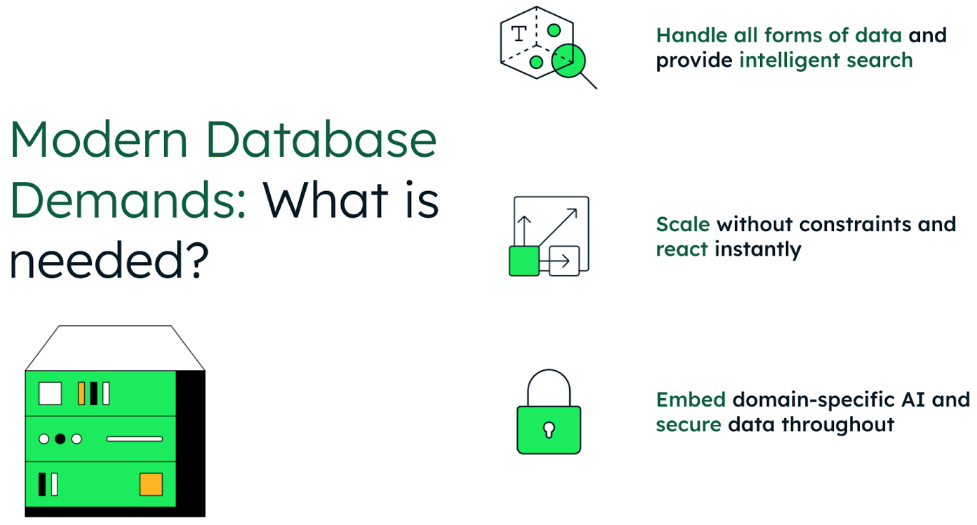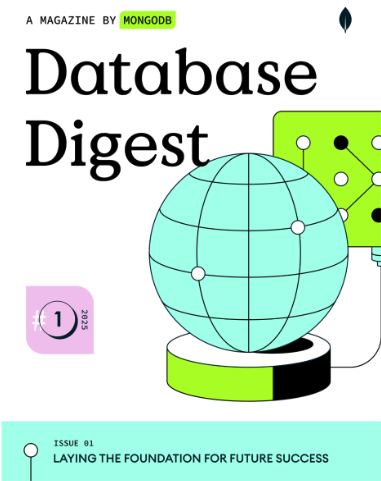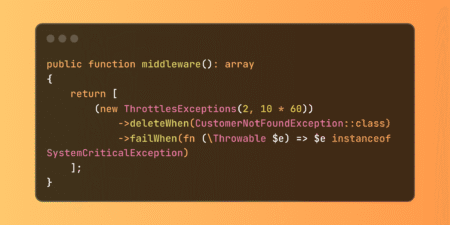Today at MongoDB .local Toronto, I’m excited to share the first issue of Database Digest—MongoDB’s new digital magazine that explores the critical role of data in powering modern applications. This inaugural issue explores modern data architecture, and shows how—when the right data foundation meets emerging technologies—pioneering companies are fundamentally reimagining what’s possible.

The dawn of data ubiquity
Currently, we stand in what McKinsey calls the “data ubiquity era“— with data flowing through organizations as essentially as electricity powers the modern world. The transformation to this era has brought both unprecedented opportunity and formidable challenges. Organizations must simultaneously manage huge volumes of data while delivering the real-time, personalized experiences that define competitive advantage today.
Successfully doing so doesn’t mean merely adopting new technologies. Instead, it requires fundamentally rethinking how data is stored, processed, and leveraged to drive business value. Traditional relational database systems simply cannot meet these demands. The future belongs to organizations with data architectures designed for the agility, scalability, and versatility needed to handle diverse data types while seamlessly integrating with emerging technologies like AI.
The cornerstone of AI success
The rise of AI, and the speed at which the market has been changing have fundamentally shifted the importance of adaptability. However, software can only adapt as fast as its foundation allows.
At MongoDB, we believe modern databases are the cornerstone of the age of AI, providing the essential capabilities needed for success in this new era. To do so, they must be able to:
Handle all forms of data and provide intelligent search: Modern databases consolidate structured and unstructured data into a single system, eliminating silos that restrict AI innovation. They ground AI output in accurate, contextual data that drives better outcomes.
Scale without constraints and react instantly: Databases should be able to adapt to unpredictable workloads and massive data volumes without performance degradation. They should enable real-time decisions and actions when opportunities or threats emerge.
Embed domain-specific AI and secure data throughout: Modern databases enhance accuracy with specialized models that reduce hallucinations, and they protect information at every stage without sacrificing speed or functionality.

The impact of a modern database on AI innovation isn’t theoretical—we’re seeing organizations like Swisscom leverage this approach to apply generative AI to their extensive expert content library, transforming how they serve the banking industry by delivering bespoke, contextual information within seconds.
The AI revolution
Perhaps nowhere is the impact of a modern data foundation more profound than in the rapid evolution of AI applications. In just a short time, we’ve progressed from simple LLM-powered chatbots to more advanced agentic systems capable of understanding complex goals, breaking them into manageable steps, and executing them autonomously—all while maintaining context and learning from interactions.
This represents more than incremental progress—it’s a fundamental shift in how AI serves as a strategic partner in solving business challenges. MongoDB sits at the heart of this transformation, providing the critical bridge between AI models and data while enabling vector storage, real-time processing, and seamless integration with LLM orchestrators.
Companies like Questflow demonstrate the power of this approach, revolutionizing the future of work through a decentralized, autonomous AI agent network that orchestrates multiple AI agents collaborating with humans. By leveraging MongoDB’s flexible document model and vector search capabilities, they’re enabling startups to create dynamic AI solutions that handle everything from data analysis to content creation, while maintaining context and learning from interactions.
Modernizing legacy systems: the strategic imperative
For established enterprises, the journey to a modern data foundation often begins with addressing the legacy systems that consume up to 80% of IT budgets yet constrain innovation. Modernization isn’t just a technical upgrade—it’s a strategic move toward growth, efficiency, and competitive advantage.
The evidence is compelling: Bendigo and Adelaide Bank achieved a staggering 90% reduction in both time and cost modernizing core banking applications using MongoDB’s repeatable modernization framework and AI-powered migration tools. This transformation isn’t just about cost savings—it’s about creating the foundation for entirely new capabilities that drive business value.
Modern data architecture must embody flexibility across multiple dimensions—from supporting diverse data models to providing deployment options spanning cloud-native, cloud-agnostic, and on-premise environments. This approach enables organizations to break free from silos, integrate AI capabilities, and create a unified data foundation supporting both current operations and future innovations.
What’s next for data
The organizations featured throughout Database Digest share a common vision: they recognize that tomorrow’s success depends on today’s data foundation. The convergence of flexible document models, advanced AI integration, and cloud-native capabilities isn’t just enabling incremental improvements—it’s powering applications and experiences that were never before possible.
So I invite you to explore the full, inaugural issue of Database Digest to discover how MongoDB is helping organizations across industries build the foundation for tomorrow’s success. This isn’t just about technology—it’s about creating the foundation for transformation that delivers real business value in our increasingly data-driven world.
Visit mongodb.com/library/database-digest to download your copy and join us on this journey into the future of data.
Source: Read More


